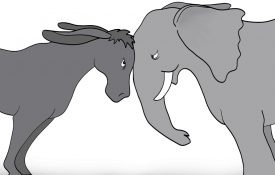-

Political Extremists Are Less Susceptible to Common Cognitive Bias
People who occupy the extreme ends of the political spectrum may be less influenced by outside information on a simple estimation task than political moderates. Visit Page
-
Examining Flip Side Of A Firm’s Social Responsibility Record
NPR: Goldman Sachs has given hundreds of millions of dollars to charity in recent years. In part, its effort to do good has been shaped by the battering its reputation took during the financial meltdown in 2008 when Goldman traders were accused of misleading investors. The efforts of companies to look good in the public eye may seem positive but there is also a disturbing side of doing good work, as NPR's social science correspondent Shankar Vedantam tells our own Steve Inskeep. ... I'm not going to tell you it's a bad idea, Steve. But I will say that it comes at a risk. I spoke with Elaine Wong.
-
Wheat People vs. Rice People
The New York Times: AMERICANS and Europeans stand out from the rest of the world for our sense of ourselves as individuals. We like to think of ourselves as unique, autonomous, self-motivated, self-made. As the anthropologist Clifford Geertz observed, this is a peculiar idea. People in the rest of the world are more likely to understand themselves as interwoven with other people — as interdependent, not independent. In such social worlds, your goal is to fit in and adjust yourself to others, not to stand out. People imagine themselves as part of a larger whole — threads in a web, not lone horsemen on the frontier. In America, we say that the squeaky wheel gets the grease.
-
Your Adult Siblings May Be The Secret To A Long, Happy Life
NPR: Somehow we're squeezing 16 people into our apartment for Thanksgiving this year, with relatives ranging in age from my 30-year-old nephew to my 90-year-old mother. I love them all, but in a way the one I know best is the middle-aged man across the table whose blue eyes look just like mine: my younger brother Paul. Paul and I kind of irritated each other when we were kids; I would take bites out of his precisely made sandwiches in just the spot I knew he didn't want me to, and he would hang around the living room telling jokes when he knew I wanted to be alone with the boy on the couch. Read the whole story: NPR
-
How the Brain Uses Glucose to Fuel Self-Control
The Wall Street Journal: Steam power sets massive, clunky turbines into motion. Horsepower involves explosions of work, with engines hurtling cars down a freeway. Solar power taps the awesome might of the sun itself and may someday light entire cities. But willpower seems different. For one thing, it more often describes disciplined inactivity, such as resisting a temptation, than some observable action. While metaphorical horses produce horsepower and the sun solar power, it’s not easy to frame “wills” in an equivalent way.
-
The Power in Writing About Yourself
The Atlantic: "This is not a replacement for people or human contact," said the designer Albert Lee of his new creation, an app called Emojiary. I wanted to believe him. Every day you get a text from the Emojiary bot. It asks how you're doing. You write it back, texting out your most visceral feelings, and it accepts them without judgment. At least, none that I was able to sense. ... Though, it makes sense. There is a lot of research on the health benefits of introspective writing of the sort you do when keeping a journal (the term journaling just never felt okay to me).

